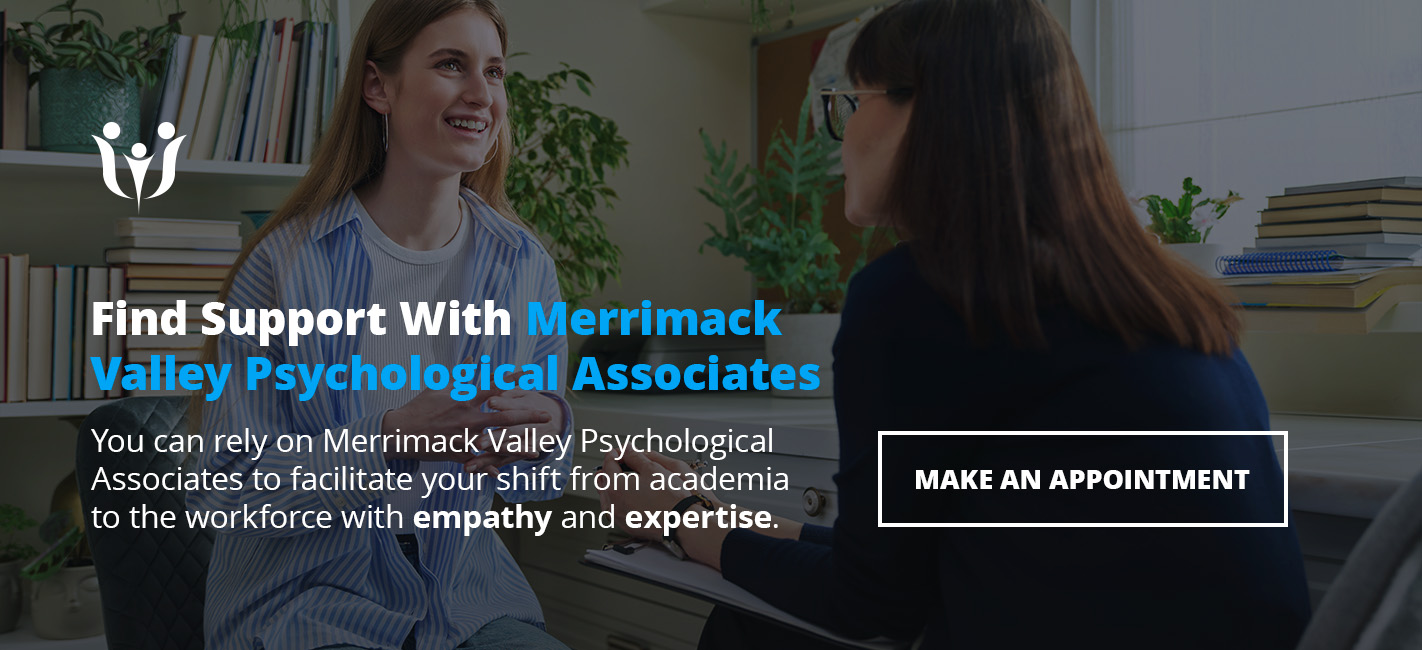Transitioning From Academia to the Office
The shift from student to full-time employee is exciting, but it’s also significantly challenging. According to a far-reaching survey of young professionals in the United States, more than a third of graduates feel that college didn’t adequately emotionally prepare them to enter the workplace. Because of this gap in the education system, therapy for young adults is paramount as they move from one crucial life stage to another.
Some culture shocks you might experience as a new worker include:
- A rigid schedule with fewer off days and to-the-minute time tracking.
- More formal office etiquette, including dress codes, vocabulary and posture.
- Hierarchical roles and chains of command with varying social expectations.
- How individual deadlines impact many employees, making responsibility crucial.
How Can Therapy Help New Workers Adapt?
If you sit down with your counselor, you can discuss and strategize for these expectations before jumping into the deep end. You’ll feel better prepared and make a great first impression if equipped with the necessary tools to navigate the corporate world’s many social and behavioral conventions.
Managing Stress and Workplace Anxiety
School, college and university have their fair share of nerve-wracking moments. However, when work is involved, stress and anxiety can ramp up because of financial responsibilities and new challenges. The Society for Human Resource Management explains that new Generation Z hires are feeling disillusioned and anxious about their budding careers, and it’s easy to understand why.
How Can Therapy Help Mitigate Workplace Anxiety?
Young adults can learn coping strategies through dialectic and cognitive behavioral therapy, such as:
- Setting boundaries
- Identifying triggers
- Managing time
- Practicing self-care
- Seeking support
Building Confidence in the Office
Confidence is a key ingredient in career satisfaction, and it can take a while to build up as you learn the ropes and get to know your coworkers. When you’re secure in yourself, coworkers will likely find it easier to interact with you, you’ll feel more fulfilled in your job, and your work quality will be better.
Research has found that the COVID-19 pandemic disproportionately affected Gen Z, leading to increased isolation, loneliness and mental health concerns. These setbacks can significantly impact confidence. Education largely pivoted to virtual platforms in 2020, but more and more companies are implementing back-to-the-office policies. This means a change in gears for a generation forced into digital socialization at such a formative age.
How Can Therapy Help Build Self-Confidence?
Good therapists build trust and common ground with their clients. They create a safe space to talk through insecurities, unearth negative self-talk and discuss ways to overcome feelings of inadequacy. Through in-depth sessions, young adults can build self-belief by receiving support and encouragement alongside empirically tested coping strategies.
Preventing and Dealing With Burnout
Untreated anxiety, mounting work-related stress, overstimulation and a lack of work-life balance can overwhelm even the most diligent employees. Microsoft’s Work Trend Index showed sobering statistics that shed light on younger workers’ increased susceptibility to the occupational phenomenon called “burnout.” While all ages experienced some burnout, Gen Z and millennial respondents experienced more.
How Can Therapy After College Ward Off Burnout?
Therapy can help prevent exhaustion, cynicism and inefficacy, the three key components of burnout, by:
- Helping you identify early warning signs such as decreased motivation, chronic stress and self-doubt.
- Teaching you stress management and strategies and explaining how to “switch off” after a work day.
- Working through various coping skills, such as practicing self-compassion, time blocking and delegating.
- Reframing negative thoughts and pinpointing patterns of thinking that sabotage your mental well-being.
Learning to Fight Imposter Syndrome
Imposter syndrome affects high-achieving professionals in high-pressure careers like health care, veterinary medicine, dentistry and pharmacy. People with imposter syndrome can’t process or accept their professional successes and accolades, so they develop feelings of inadequacy, anxiety and even depression. They see themselves as frauds who may soon be found out, even though there is concrete evidence that they are qualified for their job.
People with the following traits are more likely to develop imposter syndrome:
- Perfectionism
- Atychiphobia (fear of failure)
- Achievemephobia (fear of success)
- Low self-esteem
- Neuroticism
How Can Therapy Help Fight Imposter Syndrome?
If you’re at risk of developing imposter syndrome, you can work with your counselor to acknowledge and identify false beliefs, challenge negative self-talk and explore your past for potential triggers. Your therapist may recommend strategies like keeping a gratitude or success journal, practicing self-compassion and reciting affirmations.
Maintaining a Good Work-Life Balance
A good work-life balance is essential for thriving in the working world, particularly for young adults. Studies show that millennial and Gen Z graduates entering the workforce greatly value flexible work hours, remote working options and annual leave when considering job satisfaction, and higher job satisfaction leads to better work quality. To get the most from your job and avoid job-hopping, carefully consider the work-life balance each prospective employer can offer.
How Can Therapy Help You Attain a Good Work-Life Balance?
Knowing what you want is the first step toward getting it, and therapy is the perfect place to work that out. Your counselor will get to know your values, priorities, goals, pet peeves and motivations. They will then help you use those character traits to discern what to look for in a new employer and where you may have to make some compromises.
Improving Communication Skills
Respectful workplace communication helps build rapport between coworkers, mitigates conflict, endears clients, ensures tasks are done efficiently and maintains trust and transparency in the company. Communicating effectively and professionally is vital to settling into the company culture and furthering your career. It also fosters an open dialogue between you and your supervisor so you can discuss any concerns or struggles you’re experiencing.
How Can Therapy Build Better Communication
Therapy is an excellent, safe opportunity to practice clear, courteous communication. Your counselor can help you refine your workplace interlocution by:
- Identifying and addressing communication patterns such as passive-aggressiveness or a lack of eye contact.
- Teaching you new strategies like active listening, welcoming body language and appropriate vocabulary.
- Providing a compassionate sounding board for any concerns or reservations about building new relationships at work.
Find Support With Merrimack Valley Psychological Associates
You can rely on Merrimack Valley Psychological Associates to facilitate your shift from academia to the workforce with empathy and expertise. Our experienced team of licensed therapists and counselors has been through what you’re facing and can provide valuable guidance along with clinically tested coping strategies. For support during this pivotal stage of life, make an appointment with us today or learn about our virtual teletherapy options.



